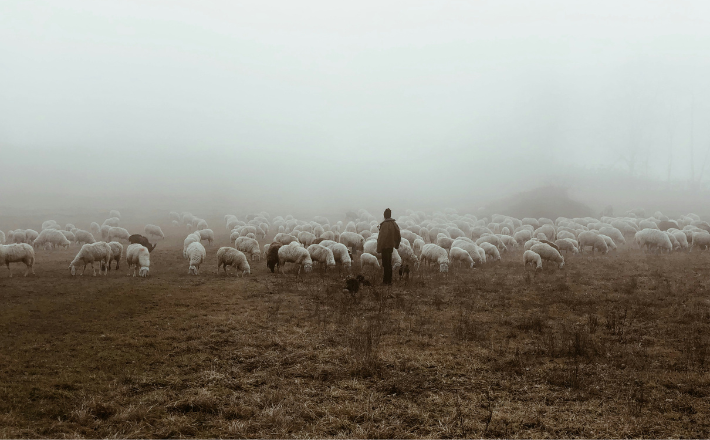Commentary on Jeremiah 4:11-12, 22-28
Have you ever read Alexander and the Terrible, Horrible, No Good, Very Bad Day to your children?1 This is a rare children’s book in which the main character, a young boy named Alexander, has a very bad day; the entire book is focused on what goes wrong for Alexander. He wakes up with gum in his hair, and the day gets worse from there. A host of bad things happen to Alexander as he goes to school and the dentist and then eventually comes home for the night. The evening ends with his cat going to sleep with his brother instead of him.
I appreciate this book because it doesn’t sugarcoat that sometimes children will encounter bad days or seasons in their lives that are hard to navigate and require experiencing the full range of human emotions, including the hard ones, such as anger, hurt, and sorrow, which are often minimized or less valued in our culture.
Our biblical text envisions or describes just such a season for the people of Israel, albeit with far bigger consequences and more violent realities than Alexander faced. This is an unrelentingly terrible, horrible, no good, very bad vision of the future for Israel. As you consider which passages to preach to your community, note the following: If you are looking for good news in this biblical text, you will need a magnifying glass. If you are looking for hope in this biblical text, there is none. If you are looking for the goodness of God, look elsewhere. There is only evil, destruction, ruin, violence, anger, judgment, and mourning.
This passage can be interpreted as either foretelling or retelling the Babylonian conquest. The exact dating of when this was written is not known. During the life of Jeremiah, the nation had undergone a period of intense social and religious upheaval. The reign of Josiah saw the implementation of intense religious and cultural reforms, eradicating idolatry, destroying sites of idol worship, restoring the temple in Jerusalem, and removing foreign cultural influences. However, Josiah’s reforms were short-lived, and they ended upon his death.
After the brief reign of Jehoahaz, who was dethroned by the Egyptian pharaoh and forcibly removed to Egypt, Jehoiakim was installed as king. Biblical and rabbinical sources document him as being incredibly violent, idolatrous, and unjust. Under his reign, Judah increasingly became a pawn in the conflict between Babylonian and Egyptian powers, resulting in vassal status. Jehoiakim was beholden to external powers (Egypt and Babylon), switching allegiances, which would eventually result in his execution by Babylon after they besieged Jerusalem in 597 BCE.
Shortly after his death at the hands of the Babylonians, much of Judah would be led into Babylonian exile. Ten years later, Judah rebelled, and the Babylonians besieged the city and destroyed the temple and the entire city. The nation was brutally devastated.
This passage vividly foretells or describes the human and ecological impact of the Babylonian conquest. The conquering forces are described as approaching like an unrelenting and violent wind that will destroy all within its path. (Graphic imagery of the human trauma of war can be found in verses 13–21.) The images of ecological devastation hauntingly evoke all-too-familiar images from contemporary war zones in Ukraine and Gaza, in which unstoppable imperial forces have wreaked unchecked havoc on a much smaller country. The land is empty (verse 23). Everything that once stood or lived has been destroyed or has fled (verse 26). Entire cities and towns that were once vibrant are piles of rubble.
There are haunting interpretative possibilities in the ecological themes of this text. The land is quaking in pain and fear (verse 24). Birds have been forced to migrate (verse 25). Drought and heat have devastated what was once fertile (verse 26). The earth is grieving, and the sky is dark and foreboding (verse 28). While this ecological destruction is the consequence of war, the imagery also evokes the destruction of disasters caused by climate change, and there is interpretative room to contextualize this to our contemporary world, which is simultaneously devastated by war and environmental crises.
If there is any whiff of good news to be found in this biblical text, it is in verse 27, which states that though the land will be severely harmed, it will not be completely and finally destroyed. This contrasts with the unrelenting nature of the rest of the passage, which concludes with God’s declaration of unwillingness to change God’s mind or to reverse this judgment (verse 28).
This passage invites us to sit with a horrific vision of judgment and destruction as the result of evil and wickedness. The theology here is devastating. God is represented as ensuring the destruction of God’s people. Similar theological images can be found throughout Jeremiah. As a preacher, how do you engage Jeremiah’s theology?
One of the most important and advanced skills my preaching students can develop is the ability to contest and disagree with biblical texts, and Jeremiah requires much contesting if you do not wish to endorse a theology of a punitive, violent God who (within that theology) may be considered one of the most violent single forces in human history.
Even as my own theology leads me to strongly critique the potential violence of God glimpsed in this text, I still try to sit with this haunting description of judgment. As a justice-minded theologian, I believe in a God who will judge evil, and this passage invites me into the uncomfortable space of reconciling that with my understanding that God would not commit mass or systemic violence. Disagreeing with and contesting this biblical text can also be accompanied by deep humility in which we realize our own theological and human limitations.
Like our children, who can recognize and learn much about their own lives through reading about another child’s terrible, horrible, no good, very bad day, maybe we can find connection and meaning in our war-torn and environmentally devastated world through reading about a terrible, horrible, no good, very bad day faced by God’s people long ago. Maybe we can develop our capacity to sit amid the anxiety, grief, trauma, and pain that war and ecological disaster are forcing upon us.
Notes
- Judith Viorst. Alexander and the Terrible, Horrible, No Good, Very Bad Day (New York: Athenum Books, 1972).


September 14, 2025